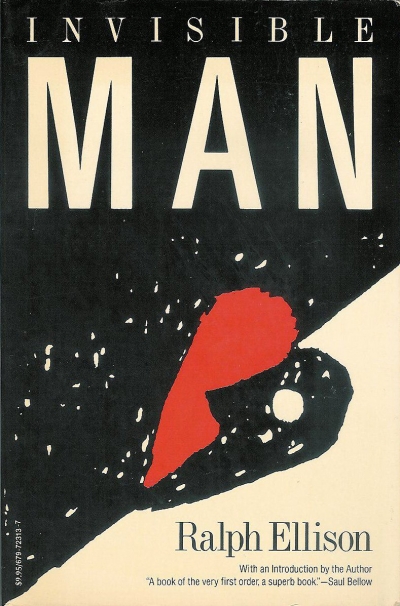



 Yusuf Progler
Yusuf Progler
INVISIBLE MAN By Ralph Ellison. Vintage International Edition; New York, NY, US. 1996. pp:xxvi, 581. Pbk: US$10.
'I am an invisible man. No, I am not a spook like those who haunted Edgar Allan Poe; nor am I one of your hollywood-movie ectoplasms. I am a man of substance, of flesh and bone, fiber and liquids - and I might even be said to possess a mind. I am invisible, understand, simply because people refuse to see me. Like the bodiless heads you sometimes see in circus sideshows, it is as though I have been surrounded by mirrors of hard, distorting glass. When they approach me they see only my surroundings, themselves, or figments of their imagination - indeed, everything and anything except me. Nor is my invisibility exactly a matter of a biochemical accident to my epidermis. That invisibility to which I refer occurs because of a peculiar disposition of the eyes of those with whom I come into contact. A matter of construction of their inner eyes, those eyes with which they look through their physical bodies upon reality.'
So begins one of the great novels in American literary history. Said by critics to be 'the classic representation of American black experience,' Ralph Ellison's Invisible Man remains today as powerful and timely as it was when it originally appeared a half century ago. Though in print in various editions since it was first published in 1947, this new international edition has the added advantage of a retrospective essay by the author, penned on the occasion of his renewing its copyright in 1980.
On the surface, and as the above quote may seem to suggest, Invisible Man appears to be akin to the existentialist literature in vogue in the west at the time of Ellison's writing. While he no doubt was familiar with many of the conventions of that genre, such as developing a concern for the absurdities of everyday existence, Ellison does not allow his novel to lapse into the hopeless nihilism of so much exestentialist thought.
His concerns are too grounded in the immediate and lived experiences of the struggle for black liberation to fall into the pit of existential despair that is too often the fate of comfortable white intellectuals. It is this essential difference that places his work squarely in the African-American literary tradition.
Ellison tells the first-person story of a nameless protagonist on a 20-year journey in search of himself; it is the tale of one Black man's quest for his indentity in American society. A recurring theme in this sojourn stems from the cryptic last words of his grandfather, which he recalls from childhood: 'On his deathbed he called my father to him and said, ôSon, after I'm gone I want you to keep up the good fight. I never told you, but our life is a war and I have been a traitor all my born days, a spy in the enemy's country ever since I give up my gun back in the Reconstruction. Live with your head in the lion's mouth. I want you to overcome 'em with yeses, undermine 'em with grins, agree 'em to death and destruction., let 'em swoller you till they vomit or bust wide open.ö They thought the old man had gone out of his mind. He had been the meekest of men. The younger children were rushed from the room, the shades drawn and the flame of the lamp turned so low that it sputtered on the wick like the old man's breathing. ôLearn it to the younguns,ö he whispered fiercely; then he died.'
In the early part of the novel Ellison describes his quest for education. Upon graduating from secondary school with promise, he is invited to a gathering of influential and powerful white people who put him and a number of other young black men through a most violent and degrading spectacle, called a 'battle royale.' At its close, the badly wounded schoolboy is asked to repeat his graduation speech, which so impressed white folk when he first gave it. The audience of dignitaries, drunk and boisterous and barely attentive, taunt him as he uses language thought to be above the ability of 'Negroes.'
At one point, in outlining the goals of black education according to the school he attended (which resembles the teachings of Booker T Washington), Ellison's schoolboy uses the phrase 'social responsibility.' The audience yells for him to repeat the lofty phrase ever louder, and 'the room filled with the uproar of laughter until, no doubt distracted by having to gulp down my own blood, I made a mistake and yelled a phrase I had often seen denounced in newspaper editorials, heard debated in private.' He then yells back at them, 'social equality' and the audience's 'laughter hung smoke like in the sudden stillness.' When asked to repeat the phrase slowly, he says, once again 'social responsibility,' to which one of his white interlocutors reponds, 'Well, you, but you've got to know your place at all times.'
The demand to 'know your place' in the racist nightmare of America, especially in the early to mid-twentieth century when the novel takes place, is a dilemma Ellison often confronts. It seems that at every turn he is met with white folks and established black folks who claim to have his best interests at heart but also insist that he always know his place. Part of his search is to find this elusive place, except not on the terms of those who demand it but on his own terms.
After being awarded a scholarship to a southern 'College for Negroes' established by wealthy white people, Ellison is once again haunted by his grandfather, who this time comes to him in a dream: 'That night I dreamed I was at a circus with him and that he refused to laugh at the clowns no matter what they did. Then later he told me to open my briefcase and read what was inside and I did, finding an official envelope stamped with the state seal; and inside the envelope I found another and another, endlessly, and I thought I would fall of weariness. ôThem's years,ö he said. ôNow open that one.ö And I did and in it I found an engraved document containing a short message in letters in gold. ôRead it,ö my grandfather said. ôOut loud!ö ôTo whom it may concern,ö I intoned. ôKeep This Niger-Boy Running.ö I awoke with the old man's laughter in my ears.'
Once enrolled at the college, he has fateful encounters with one of the wealthy white founders and with the black headmaster, and falls afoul of their programme due circumstances largely beyond his control. His punishment is to leave the college for the summer and go to New York to work for the next year's tuition, having lost his scholarship. The headmaster gives him letters of recommendation, but they do not help him in the way he had imagined they would. But, like the letters of recommendation, nothing leads him to where he imagines he ought to be, and he continues to confront wealthy white and established black people who claim to be acting in his best interests.
After a disastrous but telling stint as a factory worker, he gets involved with 'the Brotherhood', a quasi-communistic group led by mysterious wealthy white folks who are ostensibly working for the betterment of oppressed peoples. Ellison's character is assigned a new name by the Brotherhood, and after being indoctrinated into its ideology becomes 'its chief spokesman in Harlem,' where he continues to display a gifted presence as a public speaker.
Remarkably, though written mostly before the fact, this part of the novel has a lot of parallels with the life of Malcolm X, especially in his involvement as a spokesman for the Nation of Islam. (One wonders to what degree Malcolm was familiar with Ellison's work). As with Malcolm X , Ellison's character grows increasingly disillusioned with the group's internal contradictions and secretive, autocratic leadership.
Though Ellison does not find the deen of Islam as did Malcolm, he does seem to have some remarkable insights into Islamic cosmology. For example, after a violent encounter with a racist white man, he realized that the man 'was in the midst of a walking nightmare,' and then asks himself, 'Would he have awakened at the point of death?' Such statements bring to mind a hadith of the Prophet Muhammad, upon whom be peace, who once said 'Most people are asleep. When they die, they awaken.'
Ellison eventually gets close to finding the meaning of his grandfather's cryptic deathbed admonition, but to recount the details here would diffuse its impact and deflate the experience of reading this novel. suffice to say that it is not what one would expect, but he does come to a realization of the unity of his seemingly disjointed and disparate life experiences. And there is hope.
These points are what distinguish this work from the existential literature toward which Ellison nods but to which he is not bound. It is a worthwhile read, both disturbing and inspiring at the same time. And while Ellison's story still speaks reams to the experiences of many Black Americans, his message seems also to be broadly applicable to other potentially 'invisible' peoples, such as, Muslims living in the west.
Recall his words at the beginning of the novel, and think of how a Muslim is treated in the west: 'When they approach me they see only my surroundings, themselves, or figments of their imagination - indeed, everything and anything except me.' Muslims who feel just a little too prodded and probed by seemingly well-established Muslim professionals, will likely feel a certain kindred spirit with Ellison, and should find this novel an enjoyable and enlightening companion.
Muslimedia: September 16-30, 1997
